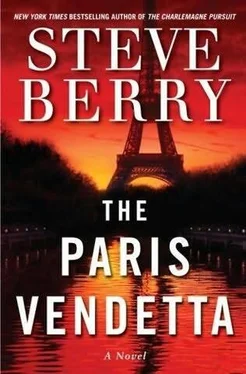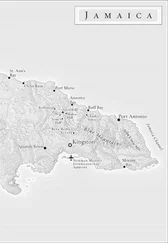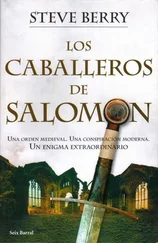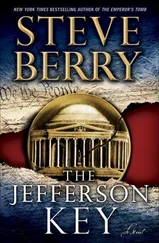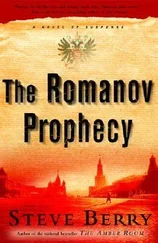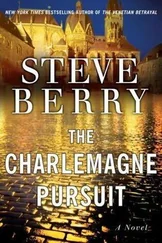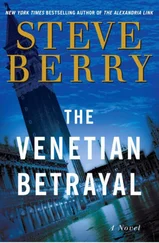
Steve Berry
The Paris Vendetta
The fifth book in the Cotton Malone series, 2009
For Gina Centrello, Libby McGuire, Kim Hovey, Cindy Murray,
Christine Cabello, Carole Lowenstein, and Rachel Kind
With Thanks and Deep Appreciation
To my agent, Pam Ahearn-I offer another bow of deep gratitude. We’ve come a long way, haven’t we? To Mark Tavani, Beck Stvan, and the wonderful folks at Random House Promotions and Sales, thanks again for a terrific job. You’re all, without question, the best.
A special thanks to a fine novelist and friend, James Rollins, who saved me from drowning in a Fijian pool; to Laurence Festal, who offered invaluable assistance with the French language; and to my wife, Elizabeth, and Barry Ahearn, who found the title.
Finally, this book is dedicated to Gina Centrello, Libby McGuire, Kim Hovey, Cindy Murray, Christine Cabello, Carole Lowenstein, and Rachel Kind.
Seven marvelous ladies.
Professionals, one and all.
Collectively, they’ve brought implacable wisdom, consistent leadership, and a vibrant creativity to all of my novels.
No writer could ask for anything more.
It’s an honor to be a part of your team.
This one’s yours.
Money has no motherland;
financiers are without patriotism and without decency:
their sole object is gain .
– NAPOLEON BONAPARTE
History records that the money changers have used
every form of abuse, intrigue, deceit, and violent means possible
to maintain their control over governments .
– JAMES MADISON
Let me issue and control a nation’s money
and I care not who writes the laws .
– MAYER AMSCHEL ROTHSCHILD
GIZA PLATEAU, EGYPT
AUGUST 1799
GÉNÉRAL NAPOLEON BONAPARTE DISMOUNTED FROM HIS HORSE and stared up at the pyramid. Two more lay in succession nearby, but this was the grandest of the three.
What a mighty prize his conquest had yielded.
The ride south yesterday from Cairo, through fields bordering muddy irrigation canals, and the quick trek across windblown sand, had been uneventful. Two hundred armed men had accompanied him, as it was foolhardy to venture this far out into Egypt alone. He’d left his contingent a mile away, camped for the night. The day had been another arid scorcher, and he’d intentionally waited until sunset before visiting.
He’d arrived ashore, near Alexandria, fifteen months ago with 34,000 men, 1,000 guns, 700 horses, and 100,000 rounds of ammunition. He’d quickly advanced south and taken the capital, Cairo, his aim being to disorganize any resistance through rapidity and surprise. Then he’d fought the Mamelukes not far from here, in a glorious conflict he’d dubbed the Battle of the Pyramids. Those former Turkish slaves had ruled Egypt for five hundred years, and what a sight-there had been thousands of warriors, dressed in colorful garb, mounted atop magnificent stallions. He could still smell the cordite, feel the roar of cannon, hear the snap of muskets, the screams of dying men. His troops, many veterans of the Italian campaign, had fought bravely. And while suffering only two hundred French dead, he’d captured virtually the entire enemy army, gaining total control of lower Egypt. One reporter had written that a handful of French subdued a quarter of the globe .
Not exactly true, but it sounded wonderful.
The Egyptians had dubbed him Sultan El Kebir-a title of respect, they’d said. During the past fourteen months, ruling this nation as commander in chief, he’d discovered that, as other men loved the sea, so he loved the desert. He also loved the Egyptian way of life, where possessions counted little and character much.
They also trusted providence.
As did he.
“Welcome, Général. Such a glorious evening for a visit,” Gaspard Monge called out in his usual cheerful tone.
Napoleon enjoyed the pugnacious geometer, an older Frenchman, son of a peddler, blessed with a wide face, deep-set eyes, and a fleshy nose. Though a learned man, Monge always toted a rifle and a flask and seemed to crave both revolution and battle. He was one of 160 scholars, scientists, and artists -savants , the press had labeled them-who had made the journey from France with him, since he’d come not only to conquer but to learn. His spiritual role model, Alexander the Great, had done the same when invading Persia. Monge had traveled with Napoleon before, in Italy, ultimately supervising the looting of that country, so he trusted him.
To a point.
“You know, Gaspard, as a child I wanted to study science. During the revolution, in Paris, I attended several lectures on chemistry. But alas, circumstances made me an army officer.”
One of the Egyptian workers led his horse away, but not before he grabbed a leather satchel. He and Monge now stood alone, luminous dust dancing in the shadow of the great pyramid.
“A few days ago,” he said, “I performed a calculation and determined that these three pyramids contain enough stone to build a wall a meter wide and three meters high around the whole of Paris.”
Monge seem to ponder his assertion. “That could well be true, Général.”
He smiled at the equivocation. “Spoken like a doubting mathematician.”
“Not at all. I just find it interesting how you view these edifices. Not in relation to the pharaohs, or the tombs they contain, or even the amazing engineering used to construct them. No. You view these only in terms related to France.”
“That is hard for me not to do. I think of little else.”
Since his departure, France had fallen into impossible disarray. Its once great fleet had been destroyed by the British, isolating him here in Egypt. The ruling Directory seemed intent on warring with every royalist nation, making enemies of Spain, Prussia, Austria, and Holland. Conflict, to them, seemed a way to prolong their power and replenish a dwindling national treasury.
Ridiculous.
The Republic was an utter failure.
One of the few European newspapers that had made its way across the Mediterranean predicted it was only a matter of time before another Louis sat on the French throne.
He had to return home.
Everything he cherished seemed to be crumbling.
“France needs you,” Monge said.
“Now you speak like a true revolutionary.”
His friend laughed. “Which you know I am.”
Seven years ago Napoleon had watched as other revolutionaries stormed the Tuileries Palace and dethroned Louis XVI. He’d then faithfully served the new Republic and fought at Toulon, afterward promoted to brigadier general, then to Général of the Eastern Army, and finally commander in Italy. From there he’d marched north and taken Austria, returning to Paris a national hero. Now, barely thirty, as Général of the Army of the Orient, he’d conquered Egypt.
But his destiny was to rule France.
“What a superfluity of wonderful things,” he said, admiring again the great pyramids.
During the ride from his camp he’d spied workers busy clearing sand from a half-buried sphinx. He’d personally ordered the excavation of the austere guardian, and was pleased with the progress.
“This pyramid is closest to Cairo, so we call it the First,” Monge said. He pointed at another. “The Second. The farthest is the Third. If we could but read the hieroglyphs, we could perhaps know their true labels.”
Читать дальше
